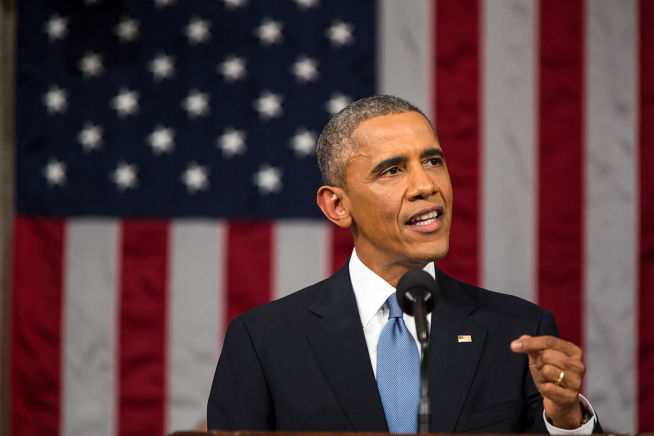Obama speaks on 50th anniversary of Selma march, Bloody Sunday
March 7, 2015
The word “we” is the most powerful word in America, said President Barack Obama, and though America has made progress in terms of racism and the rights of minority groups, there is still work to be done.
Obama said this and more in Selma, Ala., to mark the 50th anniversary of Bloody Sunday, a pivotal day in the Civil Rights Movement and an event that sparked other movements to lead to the Voting Rights Act signed in August, 1965.
Bloody Sunday was the historic day when Alabama state troopers attacked hundreds of protestors who planned to march 50 miles from Selma to Montgomery, Ala. to protest racial discrimination in voter registration.
The 600 participant group was stopped on the Edmund Pettus Bridge with tear gas, whips and nightsticks. The term Bloody Sunday comes from the bloodied bridge.
“The march on Selma was part of a broader campaign that spanned generations,” Obama said to a crowd of thousands gathered in Selma. “We gather here to celebrate them. We gather here to honor the courage of ordinary Americans willing to endure billy clubs and the chastening rod, tear gas, and the trampling hoofs..men and women, despite the gush of blood and splintered bone, stayed true to their North Star…toward justice.”
Obama stood near the bridge, which Rep. John Lewis, who was a student activist leader in Selma 50 years ago and was brutally beaten that day, said it was a situation he never would have imagined.
“If someone told me crossing this bridge 50 years ago, that one day I would be standing here introducing the first African American president, I wouldn’t know what you were talking about,” Lewis said.
Lewis, who was 25 when he crossed the Edmund Pettus Bridge 50 years ago, introduced Obama, who said Lewis is his hero.
“On that day, 600 people marched into history, walking two by two down the sidewalk. We were so peaceful. No one saying a word,” Lewis said of that day. “We were beaten, tear gassed…right here on this bridge. Seventeen of us were hospitalized, but we never became bitter or hostile. We kept believing the truths we stood for would have the final say. Our country would never be the same because of what happened on this bridge.”
If anybody says this country hasn’t made strides in the rights of minorities, Obama said to ask those who marched in Selma or ask anybody who is gay who couldn’t be out in the open 50 years ago.
“To deny progress would be to rob of us our own agency capacity our responsibility to do what we can to make America better,” Obama said.
Obama said though the country has made progress, incidents such as Ferguson and others around the country show America still has a long way to go.
Markus Flynn, vice president of the Black Student Alliance, said he agrees with Obama in the country’s progress. He said the progress, though, might be made more by the white populous.
Flynn referred to a statement Chris Rock made about white people progress.
“When we talk about race relations in America or racial progress, it’s all nonsense,” Rock said in New York Magazine. “There are no race relations. White people were crazy. Now they’re not as crazy. To say that black people have made progress would be to say they deserve what happened to them before…”
Flynn, a junior in kinesiology, said the there have been plenty of qualified African American people to run for president, but white people are now willing to vote for an African American.
Racism, Flynn said, is still present today, but in a more hidden way than in the 60s.
The American people didn’t need a Department of Justice report to show injustice still exists, Obama said.
“We need to open our heart and our ears to know our nation’s racial history still casts its long shadow upon us,” Obama said. “We know the march is not over. We know the race is not yet won.”
Obama also addressed the current issues swirling around citizenship and voting rights.
“Right now, in 2015, 50 years after Selma, there are laws across this country designed to make it harder for people to vote. As we speak, more such laws are being proposed,” he said.
Obama also said that if everybody in this country had the right to vote, the nation would still have one of the lowest turnout rates in the world.
Such a low involvement, Obama said, is a waste of years of people fighting for such rights.
“What’s our excuse today for not voting? How do we so fully give away our power, our voice in shaping America’s future?” Obama said.
The youth of today have the power and drive to shape America’s future, Obama said, and “we” is the strongest word in our language to do so.
“Selma shows us that America is not the project of any one person. The single most powerful word in our democracy is the word we. We the people. We shall overcome. Yes we can. That word is owned by no one. It belongs to everyone,” Obama said. “What a glorious task we are given to continually try to improve this great nation of ours.”
Flynn said a lot of the issues of the Selma era are still the same today, but a bit more institutionalized, and African Americans, as a whole, should remain focused and pinpoint where discrepancies lie.
“I do think we’re headed in the right direction in the push toward equality,” Flynn said. “The biggest obstacle now is getting people to know they still need to strive for it.”

















